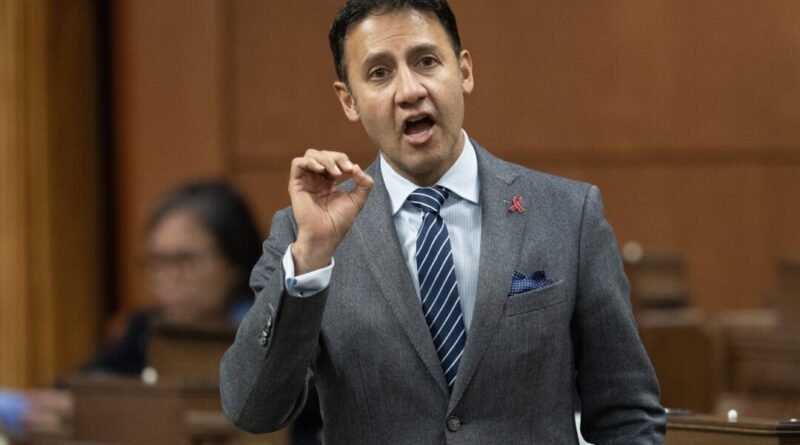After facing criticism from Conservatives and the Bloc, Virani says he is willing to consider changes to the Online Harms Act.
Justice Minister Arif Virani expressed his willingness to amend the Online Harms Act while defending the controversial legislation in the House of Commons on June 7.
Conservatives argue that the Liberal government’s proposed legislation to regulate online behavior could violate Canadians’ Charter rights, while the Bloc is advocating for splitting the bill into two parts for further debate on its more contentious aspects.
“It forces Canadians to make unnecessary trade-offs between their security and their Charter rights,” stated Conservative MP Michelle Rempel Garner during the discussion on Bill C-63. She added, “As well, this bill forces much-needed reforms into a lengthy regulatory process with no clear end in sight.”
The scope of the legislation covers social media services, live-streaming websites, and adult content platforms created by users. However, it excludes private communications such as emails and direct messages on social media.
Rempel Garner criticized the Liberals for not addressing threats like online deep-fakes through amendments to the Criminal Code to update existing laws, opting instead for an “onerous, widely criticized approach rather than safeguarding Canadians’ rights.”
The Conservative MP also raised concerns that Bill C-63 could introduce a new provision dealing with offences motivated by hatred, potentially resulting in life imprisonment for minor infractions committed by Canadians under any act in Parliament.
She characterized it as a “parasitic provision that lacks oversight in the scope of this legislation,” warning that “mere words could lead to life imprisonment.”
Rempel Garner accused the Liberal government of persistently attempting to create new regulatory and bureaucratic processes to accommodate digital space actors’ needs instead of requiring them to conform to existing Canadian laws.
“This is a regressive approach that has led to nearly a decade of inaction on the much-needed modernization of current systems, resulting in law enforcement lacking the necessary tools to prevent crime,” she remarked.
Virani countered by stating that the bill would uphold freedom of expression and indicated that the government is open to amendments that could strengthen the legislation.
The justice minister highlighted that the hate crime provision in the legislation aligns with laws in 47 U.S. states and would impose criminal penalties commensurate with the underlying offense.
A Call for In-Depth Study
Bloc Quebecois MP Claude DeBellefeuille mentioned that while the party supported the initial part of the bill concerning child pornography and the dissemination of non-consensual pornographic material, it harbored “reservations” about the second part.
DeBellefeuille urged the justice minister to bifurcate the legislation so that the first part could be swiftly adopted, allowing for more comprehensive deliberation on the second part.
Virani concurred that consultation and thorough examination were essential for the entire legislation. He stated, “We need to address all aspects because the harms are much broader than just content targeting children.”
NDP MP Peter Julian advocated for the bill to undergo scrutiny by a committee and criticized the Liberal government for long delays in passing the legislation. He pointed out some surprising or deficient aspects of the bill, particularly related to social media platforms’ transparency concerning algorithms, emphasizing the need for these issues to be addressed.
Virani mentioned that drafting the legislation involved extensive consultations with expert groups over several years.
“If there’s anything more to add, I’m willing to consider good-faith amendments and explore ways to enhance transparency and committee deliberations,” he assured.
Virani informed MPs that the Online Harms Act has four objectives: reducing exposure to harmful online content and empowering users, addressing the surge in hate crimes, ensuring victims have redress to improve remedies, and enhancing the reporting of child sexual abuse material to bolster the criminal justice response to such heinous crimes.
The legislation also aims to counter online radicalization that has led to real-life violence, like the 2017 Quebec City Mosque shooting that claimed six lives, he added.
He underscored that the federal government had gathered insights from similar laws in other countries, citing Germany and France as examples. Germany faced criticism for immediately removing all harmful content types, while France’s “overly broad” limitations on freedom of speech were invalidated as unconstitutional.
“We are avoiding those mistakes here,” Virani assured the House of Commons. “Our approach is more balanced and acknowledges the critical importance of constitutionally protected freedom of expression in Canada’s democracy.”
The legislation will also mandate online platforms to incorporate age-appropriate design features such as parental controls and warning labels to enhance the safety of their services for children.
“As a parent, it genuinely alarms me that the most hazardous toys in my home, my children’s screens, currently lack any safety standards,” he expressed. “This must change.”





